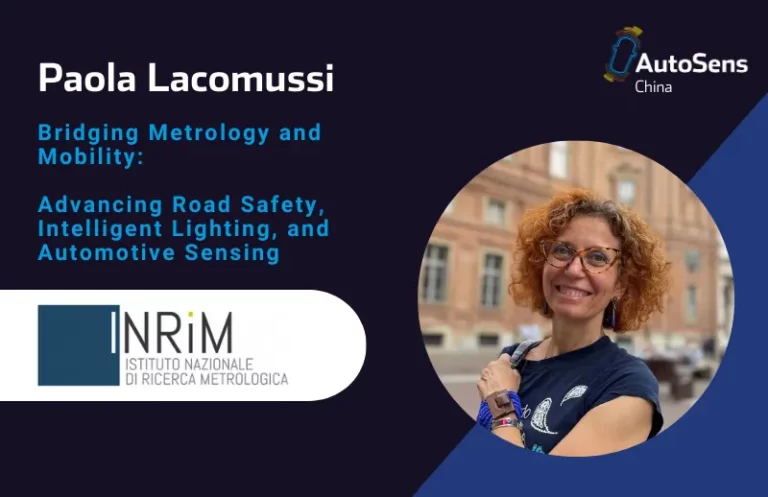
Kübra Zehra Kaşıkçı is an Automated Driving Researcher, Environmental & Engineering Psychology at the University of Surrey. She is presenting at AutoSens this September in Brussels, delivering the concept of “Developing High Fidelity and Ecologically Valid Simulation Models for Conditionally Automated Vehicles.” Kübra focuses on human-centric and intelligent software development for conditionally automated driving systems. Her research interest include human interactions with the socio-physical environment and human-centric design in automated vehicles. We caught up with Kübra ahead of the Brussels conference to find out more about her recent work, international environmental psychology platform EΨch (or ePSIch) and what she is most looking forward to about joining AutoSens.
Your job title of Environmental Psychologist is not normally one we see on our agenda for AutoSens. Could you share some details of your work at the Centre for Automotive Engineering?
As an Environmental Psychologist, I ultimately look at the dynamic interaction between people and the environment. This includes how people experience, perceive, or affect their environment and how they are affected by it in return. Although everything that we do happens within the context of an environment, the environment tends to be treated as a neutral backdrop to behaviour and is often ignored in research, planning, policy, design, as well as everyday behaviour. Environmental psychology attempts to understand contexts established through the interaction between the social and physical environment and how it affects what people can and want to do but also how they feel and think. What is within the space of a vehicle and what is outside surrounding the vehicle, for example, influences our driving experience and performance.
My work at the Centre for Automotive Engineering in the University of Surrey involves translating concepts in environmental psychology to the design of realistic simulations for the development of trustworthy and safe automated vehicles. A driver or passenger is more than just a “user” and his or her relationship and experiences with or perceptions relating to driving or being driven are more complex than moving from point A to B. If we want to build automated driving systems that can drive like people, but better and with minimum errors, we need to have a better understanding of how people function in relation to driving cognitively, socially, emotionally, and behaviourally in different environments. We also need to set up ecologically valid studies which can measure and verify the performance and effect of the automated driving systems and vehicles we develop. My role is to support my colleagues in automotive engineering in these endeavours and challenge them on their views of what “human-centric” really means.
You also work as a researcher for the H2020 ART Project TrustVehicle, what does that involve?
TrustVehicle is an exciting project where the University of Surrey acts as scientific coordinator and contributes to the development of trustworthy and intelligent level 3 or conditionally automated vehicles (L3AV) that can perform in extreme weather and mixed traffic conditions. We are part of a diverse consortium from 12 different countries and represent different parts of the supply chain looking at four different vehicle types (trucks, buses, passenger vehicles, and light commercial vehicles).
My work as a researcher for this project involves setting up robust experimental studies that are i) backed up by scientific literature and conducted qualitative and quantitative research, ii) allow for the testing of Key Performance Indicators of L3AV, and iii) verification of use cases. I work with experienced partners in the automotive industry and add my background in psychology and data science to develop reality-based, high fidelity L3AV technologies where humans are invited to be a part of from the beginning, rather than an afterthought.
Can you share more about the international environmental psychology platform ePSIch?
EΨch (or ePSIch) is a result of my frustration about the little presence of environmental psychology in design, engineering, planning, architecture, and generally, daily life. I found it strange that such a fundamentally applied science was not known to many, thus causing a disconnect between knowledge and real-life application. I saw an opportunity to help bridge that disconnect, and so the idea of EΨch was born.
About half a year later, EΨch has established itself as a network and platform reaching over 30.000 people every month. Our mission is to promote environmental psychology as a science that can contribute to solving some of the world’s most pressing issues today. By making our expertise accessible to other professionals like engineers, architects, designers, policy makers, and planners, we hope to bridge the gap between knowledge and practice, and form an inclusive, international, trans-disciplinary community inspired to create scientifically backed solutions. We do a wide range of collaborations with other organizations, curate high quality resources through our open-access library and provide insights from environmental psychologists on the application of environmental psychology on anything ranging from public spaces to airport design.
Your presentation is entitled ”Developing High Fidelity and Ecologically Valid Simulation Models for Conditionally Automated Vehicles” – could you summarise this topic and why you think it is important for the AutoSens community to learn about your research?
Much experimental research on automated driving has been and is still being carried out through simulations and driving simulator studies. This is unsurprising since it seems to be effective as well as affordable for testing purposes and for the development of control algorithms, but how reliable is it really? There seems to be a tendency to focus on technical or usability approaches, often at the cost of understanding the role of other complex and dynamic human characteristics and behaviours. In other words, these approaches could overlook or undermine elements of the reality, which then would result in simulation models that aren’t tested for existing and relevant factors. Another issue is the lack of ecologically valid simulation models due to small sample sizes or not allowing for naturally occurring behaviours by assigning pre-defined ones. Without ecological validity it is extremely hard to make any kind of scientifically backed assumptions and feed them back to the development of robust and reliable automated vehicles. I will specifically highlight conditional automated vehicles, since they reflect a critical level of automated driving with many implications on driver and road safety.
My hope for this presentation is to nudge the AutoSens community to reflect on how “human-centred” our methods are within the context of automated driving, and how much space for ecological validity our work allows. I will also spend time on discussing potential strategies that could improve how we develop high-fidelity and valid models for automated vehicles.
What are you most looking forward to about joining us at AutoSens?
What instantly drew me in was the expression “created by engineers, for engineers.” Coming from a background in environmental psychology, and now doing a doctorate and EU-level research in environmental and engineering psychology, I’m somewhat the odd one out, the person no one knows where to place. I’m at a crossroad with one foot in psychology and the other in engineering and I refuse to budge. Unfortunately, ADAS hasn’t received much attention in environmental psychology research so it’s difficult to share struggles and knowledge with my peers in psychology.
What excites me the most about AutoSens is that it will allow me to connect with my peers in engineering who do extensively work with ADAS and autonomous vehicle perception technology as well and have first-hand experiences with the challenges I also face. Coined as the world’s leading technical summit for ADAS, I’m sure I will get to meet and connect with many inspiring professionals and organizations in the field (and hopefully convince them of the value of (environmental) psychology in their work!).






